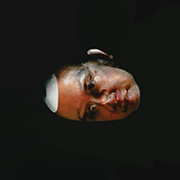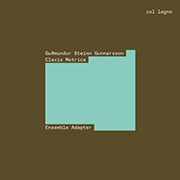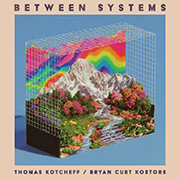 Olly Sellwood: Charlene from Big Data and other stories [Surface Press]. Up front is Peter Falconer’s narration, backed by the duo of Eva Zöllner and Heather Roche on accordion and clarinet. Falconer makes for an engaging raconteur, giving each of these half-dozen five-minute vignettes much-needed expressiveness and lucidity, despite the tricksy overdriven autotune threatening to smother him and make him hop about like a marionette. The Zöllner-Roche Duo are delightfully agile, seemingly unencumbered by tech and switching on a dime from one caricature to the next and hitting their dramatic marks with pinpoint accuracy. In the background, the music is composed by Olly Sellwood and the texts are written by Rose Biggin and Keir Cooper. I am not a fan of this sort of thing: the whole exercise is shot through with that particular British style of apologetic jokiness that makes a virtue out of pulling its punches, which I find irritating. I haven’t gone back to check but I would be surprised if Falconer doesn’t actually say “mustn’t grumble” at some point. Much of the zeitgeist (the autotune, the tales of frustration with automated customer help lines) is five minutes ago, but the whole thing is almost entirely redeemed by many of Biggin’s and Cooper’s stories turning in upon themselves from the absurd to the oblique, becoming more interesting as they make less sense. And Sellwood’s instrumental writing maintains the humour without resorting to stunts, accordion and clarinet providing lively backgrounds and interested commentary, somehow sounding more than the sum of their parts.
Olly Sellwood: Charlene from Big Data and other stories [Surface Press]. Up front is Peter Falconer’s narration, backed by the duo of Eva Zöllner and Heather Roche on accordion and clarinet. Falconer makes for an engaging raconteur, giving each of these half-dozen five-minute vignettes much-needed expressiveness and lucidity, despite the tricksy overdriven autotune threatening to smother him and make him hop about like a marionette. The Zöllner-Roche Duo are delightfully agile, seemingly unencumbered by tech and switching on a dime from one caricature to the next and hitting their dramatic marks with pinpoint accuracy. In the background, the music is composed by Olly Sellwood and the texts are written by Rose Biggin and Keir Cooper. I am not a fan of this sort of thing: the whole exercise is shot through with that particular British style of apologetic jokiness that makes a virtue out of pulling its punches, which I find irritating. I haven’t gone back to check but I would be surprised if Falconer doesn’t actually say “mustn’t grumble” at some point. Much of the zeitgeist (the autotune, the tales of frustration with automated customer help lines) is five minutes ago, but the whole thing is almost entirely redeemed by many of Biggin’s and Cooper’s stories turning in upon themselves from the absurd to the oblique, becoming more interesting as they make less sense. And Sellwood’s instrumental writing maintains the humour without resorting to stunts, accordion and clarinet providing lively backgrounds and interested commentary, somehow sounding more than the sum of their parts.
 Guðmundur Steinn Gunnarsson: Clavis Metrica [Col Legno]. The latest dispatch from planet Gunnarsson reveals more details while deepening the mystery of this singular oeuvre of compositions. As when learning a new language, the moment-by-moment activity seems inscrutable and at first undifferentiated, but patterns start to appear; those patterns in turn present a new challenge to the listener. Clavis Metrica is a vividly recorded work from 2022 performed by Ensemble Adapter, a group of four musicians without direct participation of the composer. A large-scale work comprised of eighteen sections, featuring flute, clarinet, harp and the signature array of rattles, whistles and harmonicas, it gives you the opportunity to immerse yourself in the sounds and discern a suggested outline of the intricacies of their ebb and flow, fighting the impulse to analyse everything like an ethnomusicologist. Listening to this, some things came to mind. First, stop hearing those rattles and whistles as extraneous texture. Second, reading into the background of the piece made me realise that I had missed something that should have been obvious to me from the start. Gunnarsson’s use of mobile, animated notation had a motivation beyond openness of structure and detailing; it’s about rules which are understood without being codified. Writing about Clavis Metrica, Gunnarsson discusses his experience of Icelandic versification and how it is felt through poetry, folk balladry and debate. This summary is a rough approximation of certain points, all to do with the pervasiveness of verbal poetic meter through lived experience of spoken communication, exchanged through a system of rules applied with greater or lesser formality. I’d somehow neglected this despite my introduction to Gunnarsson coming from hearing his orchestral piece Sporgýla all those years ago. The fluidity of structure, the informality of the instruments, with each piece he’s trying to achieve a heightened form of conversation. The only downside to this release is that it’s on the very serious Col Legno label so you don’t get the funky cover art that adorned Gunnarsson’s previous releases.
Guðmundur Steinn Gunnarsson: Clavis Metrica [Col Legno]. The latest dispatch from planet Gunnarsson reveals more details while deepening the mystery of this singular oeuvre of compositions. As when learning a new language, the moment-by-moment activity seems inscrutable and at first undifferentiated, but patterns start to appear; those patterns in turn present a new challenge to the listener. Clavis Metrica is a vividly recorded work from 2022 performed by Ensemble Adapter, a group of four musicians without direct participation of the composer. A large-scale work comprised of eighteen sections, featuring flute, clarinet, harp and the signature array of rattles, whistles and harmonicas, it gives you the opportunity to immerse yourself in the sounds and discern a suggested outline of the intricacies of their ebb and flow, fighting the impulse to analyse everything like an ethnomusicologist. Listening to this, some things came to mind. First, stop hearing those rattles and whistles as extraneous texture. Second, reading into the background of the piece made me realise that I had missed something that should have been obvious to me from the start. Gunnarsson’s use of mobile, animated notation had a motivation beyond openness of structure and detailing; it’s about rules which are understood without being codified. Writing about Clavis Metrica, Gunnarsson discusses his experience of Icelandic versification and how it is felt through poetry, folk balladry and debate. This summary is a rough approximation of certain points, all to do with the pervasiveness of verbal poetic meter through lived experience of spoken communication, exchanged through a system of rules applied with greater or lesser formality. I’d somehow neglected this despite my introduction to Gunnarsson coming from hearing his orchestral piece Sporgýla all those years ago. The fluidity of structure, the informality of the instruments, with each piece he’s trying to achieve a heightened form of conversation. The only downside to this release is that it’s on the very serious Col Legno label so you don’t get the funky cover art that adorned Gunnarsson’s previous releases.
 Thomas Kotcheff & Bryan Curt Kostors: Between Systems [Post Tonal]. Disgusting. Old farts will remember the new millennium’s brief fad for “remixing” Steve Reich, an exercise as fatuous as wallpapering the Eiffel Tower. As another sign that things have only gotten worse, pianist Thomas Kotcheff has teamed up with Bryan Curt Kostors on modular synths and various electronica to produce a set of chill-out mixes of pieces by Morton Feldman and John Cage. The Feldman pieces are brief solo piano works from the early Fifties: all five Nature Pieces are played, some with “Beats”. The piano is “Glitched”. Sounds are backmasked, harmonic layers are expanded and each piece’s “growing energy” and “climax” are heavily underlined with various safety colours for the benefit of those too thick to hear much of anything when subjected to the original. I’ve never felt so confident that I’m not a fuddy-duddy as when I say that this sucks; not because it’s trying something new but because that new thing is a dull parody of clueless newness for its own sake. Not just that it’s uninspired, but it’s airily dismissive of the actual music they’re interpreting, as though Feldman and Cage are blank canvases for Kotcheff and Kostors’s doodling. (The sleeve notes come with “Track Narratives” which detail the process used to treat each track, reading much like the menu at a pretentious eatery describing how they’ve seasoned your pulled pork. I’ve also learned that “Nature Piece 4 is among Feldman’s most popular works”.) For the rest of the album, the pair appear to have run out of ideas and settle into treating all the resonant pauses between Intermission 3 and Intermission 5 as free space to fuss and fidget about in like an unwitting toddler at Wigmore Hall. They do the same fidgeting for two Cage pieces: with tedious inevitably, they are Dream and In A Landscape, a pair of works subjected to so much midwittery over the years I have come to almost hate them.
Thomas Kotcheff & Bryan Curt Kostors: Between Systems [Post Tonal]. Disgusting. Old farts will remember the new millennium’s brief fad for “remixing” Steve Reich, an exercise as fatuous as wallpapering the Eiffel Tower. As another sign that things have only gotten worse, pianist Thomas Kotcheff has teamed up with Bryan Curt Kostors on modular synths and various electronica to produce a set of chill-out mixes of pieces by Morton Feldman and John Cage. The Feldman pieces are brief solo piano works from the early Fifties: all five Nature Pieces are played, some with “Beats”. The piano is “Glitched”. Sounds are backmasked, harmonic layers are expanded and each piece’s “growing energy” and “climax” are heavily underlined with various safety colours for the benefit of those too thick to hear much of anything when subjected to the original. I’ve never felt so confident that I’m not a fuddy-duddy as when I say that this sucks; not because it’s trying something new but because that new thing is a dull parody of clueless newness for its own sake. Not just that it’s uninspired, but it’s airily dismissive of the actual music they’re interpreting, as though Feldman and Cage are blank canvases for Kotcheff and Kostors’s doodling. (The sleeve notes come with “Track Narratives” which detail the process used to treat each track, reading much like the menu at a pretentious eatery describing how they’ve seasoned your pulled pork. I’ve also learned that “Nature Piece 4 is among Feldman’s most popular works”.) For the rest of the album, the pair appear to have run out of ideas and settle into treating all the resonant pauses between Intermission 3 and Intermission 5 as free space to fuss and fidget about in like an unwitting toddler at Wigmore Hall. They do the same fidgeting for two Cage pieces: with tedious inevitably, they are Dream and In A Landscape, a pair of works subjected to so much midwittery over the years I have come to almost hate them.
Kotcheff made a fine recording of Rzewski’s Songs of Insurrection not too long ago, which just makes things worse as he should know better. This LP isn’t out till next week so I don’t have a link to where you can buy it; instead I’ve link to the promo for last week’s launch party in LA. We’re asked to “think of Tony Bennett’s rendition of The Beatles’ “Eleanor Rigby””, although I don’t recall Bennett attempting to beatbox on it. The programme also credits Celine Dion with writing “The Power of Love”.
